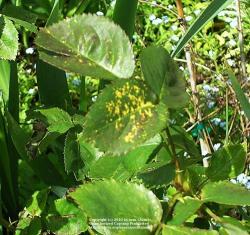I just read an interesting quote on hmf. I know that that site isn't always accurate, but this was posted by Lyn, who I believe is a moderator.
http://www.helpmefind.com/rose...
She claimed that...
Now that I've praised 'Caramella 86' & drawn attention to the fact that it's available from only 1 source, I feel I've an obligation to mention the unfortunate fact that the own-root plant in my present garden is virused. I grew this rose for 3 or 4 years before unmistakable RMV symptoms appeared for the first time in 2006. Since then, symptoms have not returned, but I now know for certain that the plant is infected & that it's only a matter of time before the evidence will resurface. Thus far, the plant's vigor appears normal & bloom production remains high. I grew Caramella for a number of years in a previous garden & do not recall ever encountering signs of RMV -- which, of course, does not mean that the plant was definitely not virused. For what it's worth, I'm almost certain that my first plant was grafted.
Comments from the experts here?
